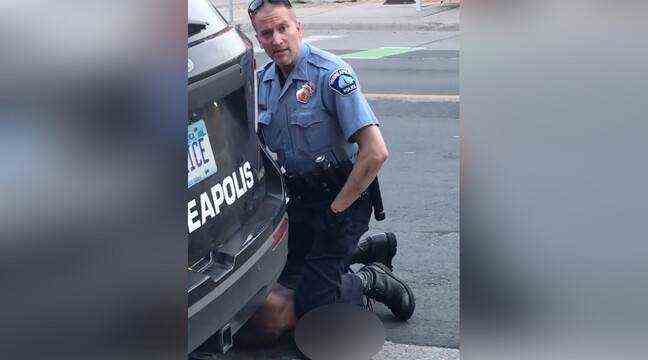Death of George Floyd: Derek Chauvin refuses to testify at his trial, deliberations begin Monday – 20 minutes
- Pleadings end Monday at the trial of Derek Chauvin.
- The ex-cop has been charged with three charges, including the second degree murder of George Floyd.
- In case of conviction, Derek Chauvin risks in theory between 10 and 15 years in prison.
From our correspondent in the United States,
The trial ended as it started: with 12 jurors facing images of George Floyd’s agony below Derek Chauvin’s knee. And in oral argument on Monday, the prosecution insisted, “You can trust your eyes, it wasn’t policing, it was murder. The ex-policeman having refused to testify, his lawyer tried to put a “reasonable doubt” in the minds of the jury on the cause of death of George Floyd, assuring that many factors – the drugs and the condition of the heart of the victim, in particular – had played.
It is now up to the jury to try to agree on a verdict. In the event of guilt, Judge Cahill will then be responsible for determining a sentence. For an unintentional second-degree murder, Derek Chauvin risks in theory between 10 and 15 years of imprisonment but the prosecutor could ask for a heavier sentence.
“Not the police trial”
In the eyes of much of the public, the death of George Floyd has become a symbol of police violence and systemic racism that plague America. But Steve Schleicher of the DA’s team was careful to avoid this double-edged prism, repeating it: “This is not the police trial. It’s the accused’s trial, and he betrayed his badge. He did not respect his oath: “To protect with courage, to serve with compassion” “.
The prosecutor showed the jury the images of Derek Chauvin immobilizing George Floyd for 9 minutes and 29 seconds. “Unreasonable and disproportionate use of force,” testified the Minneapolis police chief and former superior Derek Chauvin. And illustrated by terrible autopsy photos, with bruises and lacerations on the side of his face, the shoulder and back of George Floyd’s hand pressed against the pavement.
For the prosecutor, there is “no doubt”. As a pulmonologist assured last week, George Floyd died “from lack of oxygen” because he “could not breathe” with the weight of the officer on him: “You can believe your eyes. This case is what you knew from the start, what you felt in your guts, what you now know in your heart: it wasn’t policing, it was murder. “
Difficult mission for defense
Eric Nelson, Derek Chauvin’s lawyer, knows that the images that have been around the world are not favorable to his client. He therefore sought to broaden the context of the drama. Video in support, he showed the jury that “George Floyd resisted and kicked” during his arrest. According to him, “immobilizing George Floyd was reasonable for his safety and that of the officers”. Why did Derek Chauvin stay in the same position for so long? The police immediately called the fire department, with a fire station located “a few minutes away”. They therefore immobilized George Floyd until the arrival of “professional rescuers”. “Any reasonable police officer would have done the same,” insists Nelson, repeating the word “reasonable” several dozen times in his argument.
But the defense has mostly focused on the cause of death. Recalling that George Floyd suffered from hypertension and cardiac hypertrophy, that his coronary arteries were “75% and 90% blocked”, that “significant amounts” of fentanyl and methamphetamines had been found in his body, Eric Nelson s ‘is referred to the autopsy report to qualify the death as a “multifactorial death”. “To suggest that drugs have not played a role is absurd”, he hammered after more than 2h30 of pleadings, before the judge struck the hour for the lunch break.
There remains an important point of law. For unintentional second degree murder, the prosecution must prove that George Floyd died after willful violence which played a “substantial” role in his death. Clearly, there can be secondary factors. But in the United States, a verdict must be pronounced unanimously, which makes the outcome of any trial uncertain. The judge advised the jurors “to hope that the deliberations are speedy.” But be prepared for them to be long ”.

